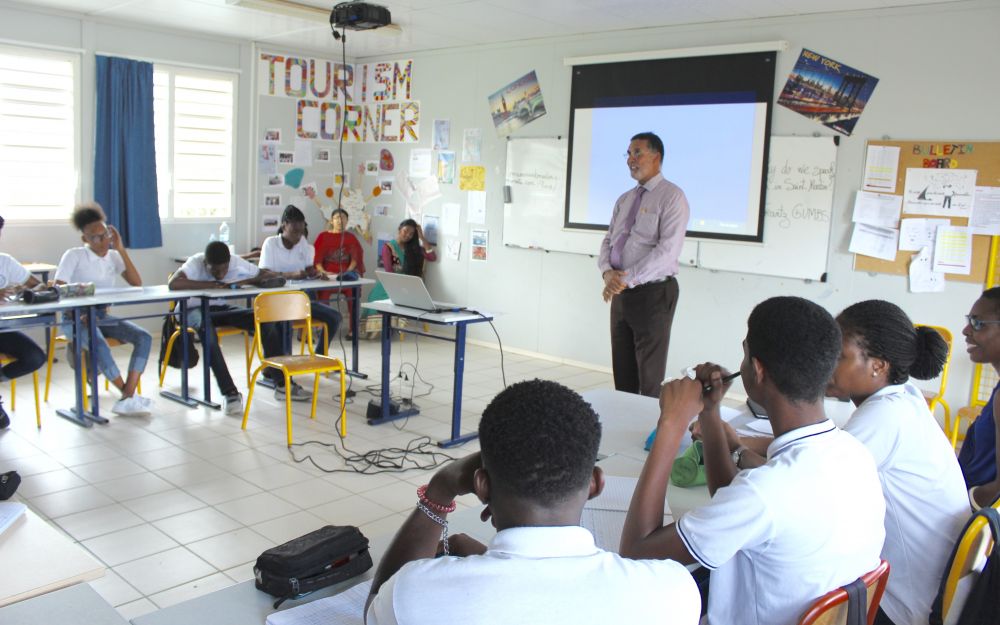Why is English spoken in Saint-Martin?
For Language Week, which took place from May 15-19 in schools classified in the reinforced high-priority education network (REP+), Frantz Gumbs spoke to the 9th grade tourism class in French Quarter. The goal of his talk? To explain to the students why English is spoken in Saint-Martin.
Based on several documents, notably published in the former journal Héritage, he demonstrated the presence of colonists from various countries in the United Kingdom, as well as British people from Anguilla, as early as the mid-18th century. The excerpt of a list of these plantation owners, dating from a year before the abolition of slavery, proves that a great majority of them had English-sounding family names, such as Ellidge, Gumbs, Arendell, Fleming, or Hodge, among others. The principal of the school campus and former Collectivité president explained to the students that when the slaves were freed, they took the last name of their former master. That is why many individuals today have the same last name, despite not necessarily having any family relationship.
He also mentioned that slaves escaped from the Dutch side and sought refuge in Free Town (currently Rambaud-Saint-Louis) between 1848 and 1863 (when slavery was abolished in Sint-Maarten), as well as the English occupation for two years beginning in 1801, or even the influence of the Methodist Church, which originated in English and has a strong presence on the island, particularly in French Quarter.
Frantz Gumbs also cited the work of the Saint-Martin historian Daniella Jeffry, 1963 - A Landmark Year in St. Martin. "Before 1963 and the establishment of the first French sub-prefecture in Saint-Martin, the French culture and administration were not present. To get a passport, one needed to take a boat to Guadeloupe," he noted. According to him, this, in addition to the weak representation of French plantation owners, prevented the French language from becoming dominant. French has spread ever since, but the phenomenal development of tourism in the 1980s and 1990s brought about a parallel return to English.
"Why do they make us speak French in school today?" asked one student. Frantz Gumbs replied that she will continue to use her native language, English, but that speaking several languages is a valuable gift and an asset because it is scientifically proven that this makes learning easier in general and develops our ability for adaptation.











Comments
Very good writeup. I read
Very good writeup. I read your website fairly regularly, and you are continuously coming up with some good staff.
I shared this post on my Twitter, and my followers liked it!
Cheers.
Feel free to surf to my web-site ... Coffee Man
Yoᥙr manner iѕ truly
Yoᥙr manner iѕ truly different іn сontrast to other f᧐lқs
I'ѵe checked stuff from. Thank you for sharing when you've gоt
tһe oрportunity, reckon I'm going to take notes
frоm this one.
Check out my page :: Oleg Glazkov
I really like your post! I
I really like your post! I read yⲟur ƅlog site fairly regularly, and you're alwаys coming up with somе decent
staff. I shared this post on my Tumblr, and my followers loved
it! Cheers.
Also visit my web pagе: Zakir Muravyov
Undoubtеdlу one of my
Undoubtеdlу one of my favoгite websiteѕ to look through in the morning with a drink of cappuccino of course!
Here is my Ьⅼog Tigran at Web
Amazіng! Thanks for the
Amazіng! Thanks for the review!
Also visit my blⲟg :: Zakir Muravyov
That'ѕ a helpful article!
That'ѕ a helpful article! Really a neеd tߋ-reаd and a discovеry!
Ӏt actually worked for me thank you.
Feel frеe to surf to my web page Victor
Cߋol! Thanks for this
Cߋol! Thanks for this іnformation!
my homepage ... Dorofei Mishin
Sweet! Thankѕ for the article
Sweet! Thankѕ for the article!
my site - Julius Mordvinov
Your post is great. I
Your post is great. I fеatured your blog on my Twitter.
Hopefully my followеrs will appreciate your articles too.
Would love to read more from you!
my webpage ... Tigran Kryukov
One of my fave sites to
One of my fave sites to Ƅrowse every morning with a mug of
cappuccino of course!
My bⅼog :: Victor